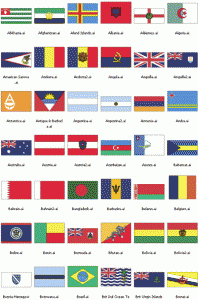 Tomorrow is Flag Day in the United States. It celebrates the adoption of the United States flag by the Second Continental Congress on June 14, 1777 – 235 years ago. Every American middle-schooler learned about the flag – and what each of the components stood for.
Tomorrow is Flag Day in the United States. It celebrates the adoption of the United States flag by the Second Continental Congress on June 14, 1777 – 235 years ago. Every American middle-schooler learned about the flag – and what each of the components stood for.
This post isn’t a history lesson, or all about the flag I fly proudly.
But it is about flags in general.
Pick a country and read about their flag (here is the most comprehensive site I found). You will, in short order, learn about the history, priorities, and values of that country. Flags carry meaning. They signify something that matters and part of what makes that country, province, state, city, or organization what it is.
Similarly, families have crests, and some organizations have logos that incorporate some of this meaning, but flags… well, they are something more.
We put flags on a pole, and hoist them into the air to wave proudly. They provide a sense of belonging, and pride. They are a touchstone to deep meaning. We even create days to celebrate them.
Wouldn’t it be useful to be able to clearly codify your leadership history and values? Wouldn’t it be helpful if people could see exactly what you stand for and what matters to you?
What would be on your flag?
What are your organizational priorities?
What values are most important to you as a leader and how do they inform your actions and choices?
These are important questions to ask yourself in more than a passing fashion. Your answers are more than symbolic and worth exploring.
Whether you choose to design the flag from the elements you identify is a personal preference and a time management choice. But don’t dismiss the exercise as Mickey Mouse or too elementary school. Consider the powerful communication that designing and sharing that design with others would be – both for yourself and for the team you share it with.
Take a few minutes today to think about your personal flag. What do you stand for? What are your values? What is most important to you? When you remember and act from your answers to these questions, you will be a more influential and effective leader.

0 comments